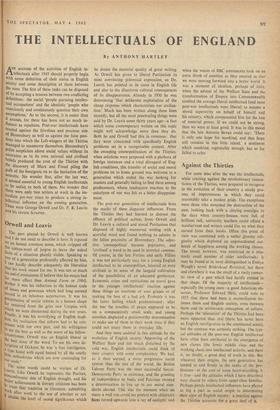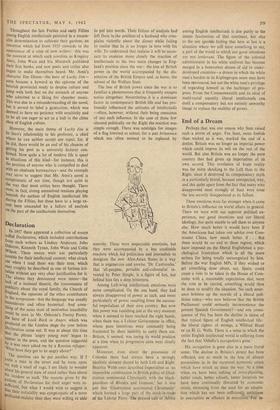Against the Thirties
For some time after the war the intellectuals, while reacting against the revolutionary roman- ticism of the Thirties, were prepared to recognise in the evolution of their country a steady pro- cess of improvement in which they could reasonably take a modest pride. The exceptions were those who mourned the destruction of the past, looking back with a cloying nostalgia to the days when country-houses were full of brilliant talk, university teachers could afford a maidservant and writers could live on what they earned from their books. Often this point of view was combined with a rather gloomy reli- giosity which deplored an unprecedented out- break of happiness among the working classes. The mood, however, was restricted to a rela- tively small number of older intellectuals: it may be found at its most distinguished in Evelyn Waugh's novel Brideshead Revisited, but there and elsewhere it was the result of a rosily roman- tic view of a past which had hardly existed in that shape. Of the majority of intellectuals— especially the young ones—a good American ob- server, Professor Edward Shils, could note in 1955 that there had been a reconciliation be- tween them and English society, even between them and its aristocratic conception of culture. Perhaps the `alienation' of the Thirties had been more apparent than real (there has never been an English intelligentsia in the continental sense), but the contrast was certainly striking. The typi- cal attitudes of the post-war English intellectual have often been attributed to the emergence of new classes (the lower middle class and the working class) into intellectual activity, and there is, no doubt, a good deal of truth in this. But whatever their origins, the new generation has tended to end firmly in the ranks of the pro- fessions—at the cost of some heart-searching, it is true—and the attitudes which I have described were shared by others from upper-class families. Perhaps purely intellectual influences have played as big a part as social origin in determining their view of English society: a reaction against the Thirties accounts for a great deal of it. Throughout the late Forties and early Fifties Young English intellectuals persisted in a reason- able determination to cultivate their gardens, an intention which led from 1953 onwards to the appearance a a crop of new writers: this was the moment at which such novelists as Kingsley Amis, John Wain and Iris Murdoch published their first books, and new poets and critics also began to make themselves heard. Mr. Amis's character Jim Dixon—the hero of Lucky Jim— soon became a byword as the epitome of the boorish provincial ready to despise culture and lump with both feet on the stomach of anyone Who admitted to a liking for chamber music. This was due to a misunderstanding of the novel, but it served to label a generation, which was deemed to have no patience with sensitivity and to be all too eager to act as a bull in the china shop of English culture.
However, the main theme of Lucky Jim is its hero's relationship to his professor, a chief Whom he can neither accept nor reject, for, if he did, there would be an end of his chances of getting his post as a university lecturer con- fi ruled. Now quite a lot of modern life is spent in situations of this kind—for instance, this is the position of anyone who is compelled to deal With an obstinate bureaucracy—and the example may serve to suggest that Mr. Amis's novel is symptomatic of our time, though not quite in the way that most critics have thought. There Were, in fact, strong unresolved tensions playing beneath the surface of English intellectual life during the Fifties, but these have to a large ex- tent been concealed by a failure of analysis on the part of the intellectuals themselves.







































 Previous page
Previous page